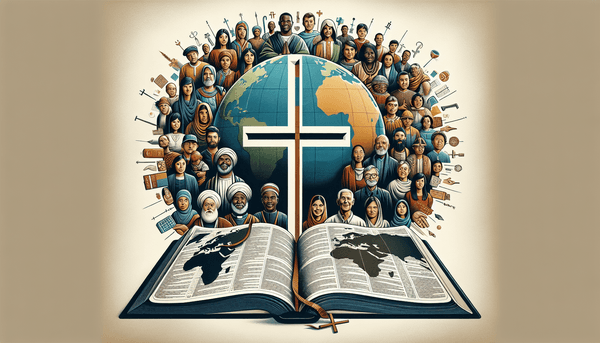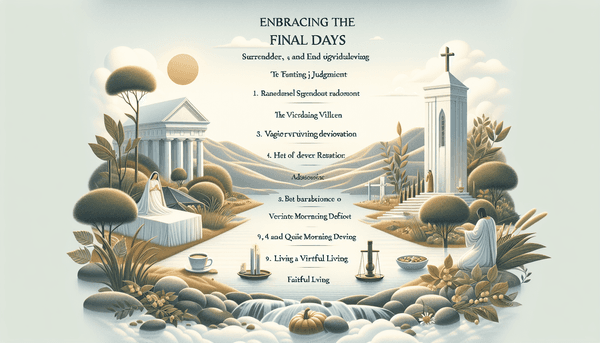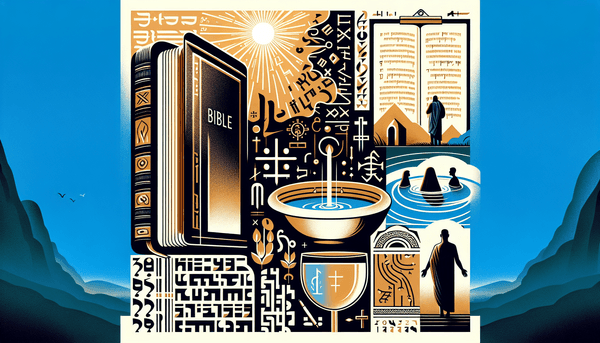Christian Identity Beyond Nationality
Christianity, a faith that spans across continents and cultures, embraces all who come to it, regardless of their ethnic or national background. As the Apostle Paul writes in Galatians 3:28, 'There is neither Jew nor Gentile, neither slave nor free, nor is there male and female, for you are all one in Christ Jesus.' This scripture highlights the inclusivity at the heart of Christian identity, encouraging believers to see beyond worldly distinctions. While our familial ties and local traditions might influence the denomination we align with, it is ultimately our belief in the life, death, and resurrection of Jesus Christ, as professed in Ephesians 2:19-22, that cements our place in the household of God. This unity is further echoed in verses such as Romans 10:12 and Colossians 3:11, reminding us that in Christ, we find a common ground that far surpasses any human division.
Genesis 3:15 and the Protoevangelium
Embedded in the narrative of the Fall in Genesis 3:15 lies the first glimmer of hope for redemption, known as the Protoevangelium, or 'first gospel.' This verse sets the stage for the ultimate confrontation between good and evil, foretelling the strife between the serpent and the offspring of the woman. It is a prophecy of victory, promising that although the serpent will strike the heel, the woman's offspring will crush its head. This victory is seen as a foreshadowing of Christ's triumph over sin and death, a theme that is later echoed in Romans 16:20 and culminates in the revelation of Jesus as the one who has overcome the world.
Conclusion
As we conclude, let us hold fast to the truth that our Christian identity is anchored not in the nations from which we come but in our shared faith in Jesus Christ. The scriptures explored in this post, from the prophetic Psalm 22 and Isaiah 53, to the foundational promise in Genesis 3:15, and the call to be a light in Matthew 5:14, all point to a faith that is inclusive, redemptive, and active. In delving into the depths of these scriptures, we gain a greater understanding of our purpose and the hope that is available to all in Christ. May this knowledge inspire us to live out our faith in a way that transcends boundaries and illuminates the world with the love of God. For further reflection on the eternal significance of our faith, consider exploring how the power of Christ's blood and our divine calling fortify our commitment to this truth.
FAQ
Q: What is the significance of the phrase 'My God, my God, why have you forsaken me?' from Psalm 22?
A: This phrase, found in Psalm 22, expresses a deep sense of abandonment and anguish. It is significant because Jesus echoes these words during His crucifixion, as mentioned in Matthew 27:46, connecting David's suffering to His own and fulfilling the psalm as a prophecy of the Messiah's suffering.
Q: How is Isaiah 53 relevant to Christian belief?
A: Isaiah 53 is crucial to Christian belief as it prophesies about the suffering servant, a figure who endures pain and humiliation for the sake of others' transgressions. Christians interpret this servant as a foreshadowing of Jesus Christ, whose sacrificial death brings salvation.
Q: What does Genesis 3:15 mean, and why is it important?
A: Genesis 3:15 is known as the Protoevangelium, the first announcement of the gospel. It predicts the struggle between the offspring of the woman and the serpent, symbolizing the battle between Jesus and Satan. It is important because it sets the stage for the Messiah's victory over evil.
Q: How does Matthew 5:14 guide Christians in their daily lives?
A: Matthew 5:14 reminds Christians that they are the light of the world, called to live out their faith visibly and impactfully. This verse encourages believers to demonstrate God's love and truth in their actions, serving as a moral and spiritual guidepost for daily living.






